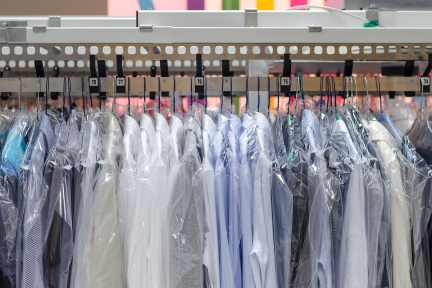
Air emissions
The compliance calendar summarizes federal standards and state regulations for dry cleaners that use perchloroethylene (perc) and provides a place to keep required records. Dry cleaners can also use the calendar to complete a self-audit:
Dry cleaners that use perc must follow federal standards that reduce the amount of perc released to the air:
They must also submit a status form within 30 days of opening, stating that they are in compliance with the federal standards:
Hazardous waste
You need a hazardous waste identification number if your business produces any amount of hazardous waste.
Businesses generating most types of hazardous waste are required to report annually, pay a fee, and obtain a license for the subsequent year. Facilities in Anoka, Carver, Dakota, Hennepin, Ramsey, Scott, or Washington County are licensed and inspected by their county. Facilities in greater Minnesota are licensed and inspected by the MPCA. If you produce only small amounts of hazardous waste, you probably qualify as a very small quality generator:
Perc-related waste, such as cooked powder residues, still-bottom residues, spent cartridges, button/lint trap waste, and separator water must be managed as hazardous waste. Use the hazardous waste code F002. See the Hazardous waste identification and management page for information on managing specific types of hazardous waste.
Training
Annual hazardous waste training is required for large quantity generators (2,200+ pounds a month) and small quantity generators (220 to 2,200 pounds a month), and recommended for very small quantity generators (less than 220 pounds a month). Free training is available from the MPCA and some metro-area counties:
- MPCA hazardous waste training (open to all Minnesota businesses)
- Dakota County training (open to all Minnesota businesses)
- Hennepin County online training (open to all Minnesota businesses)
- Ramsey County training
- Washington County training
Hazardous waste due dates
| Requirement | Due date |
|---|---|
| Hazardous waste generators fee | Mailed to license holders in first quarter, due date on invoice |
| License application | Due August 15 for Greater Minnesota businesses; Twin Cities metro businesses: contact your county |
Recycling and trash
Cleaners in the Twin Cities metro area are required to recycle if they have more than four cubic yards of trash per week.
Wastewater
Do not send dry cleaning wastewater to a septic system or storm sewer. You have three options for disposing of wastewater:
- manage it as hazardous waste and have it hauled off site for disposal
- get permission to discharge it to your local wastewater treatment plant; contact them to learn what is required; in the Twin Cities metro area, this is usually Metropolitan Council Environmental Services
- manage wastewater using an evaporator that meets the definition of a wastewater treatment unit specified in Minnesota rules (new evaporators connected to city sewer systems most likely meet the definition); the evaporator must:
- be commercially manufactured or designed, and certified by a professional engineer registered in Minnesota
- treat wastewater to below 0.7 milligrams/liter of perc before evaporation; keep proof of this on site, either from the manufacturer or lab test results
be inspected, along with all associated parts, regularly by the owner; document your inspections in the compliance calendar and refer to the detailed description of evaporator requirements:
Local regulation
Check with your county, city, and township to see if they have any additional requirements.
Upcoming perc ban
Minnesota has banned the use of perc for dry cleaning starting in 2026.
Additional resources
- Drycleaners Fund – Dry cleaners can be reimbursed for the investigation and cleanup of perc-contaminated soils.
- MnTAP resources for dry cleaners